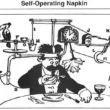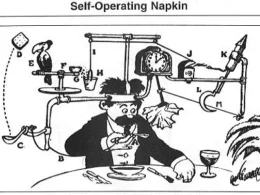More right than wrong
Fox Business: Neil Cavuto says Patrick Byrne has been “more right than wrong on this stuff.”
September 22, 2008
21 comments
Leave a Reply Cancel reply
This site uses Akismet to reduce spam. Learn how your comment data is processed.








NIce suit Doc, suitably funerial I’d say
Judd, when are we going to get more podcasts? Surely, there has been events worth reporting over the past couple of months (if not days).
Although, the way that the SEC has been vacillating, combined with the speed at which events seem to be transpiring, I could see why it might be difficult to keep up….
Keep up the great work.
It takes me three days to produce a podcast. Lately, that’s about two days too long to be topical!
I do have an evergreen topic that’s 95% finished, by the way. Should be this week. Thanks for adding your voice to the chorus of guilt I’m encountering daily!
I watched a video about a week or 2 ago and i finally realized who owns CNBC, its not GE his name is Jim Chanos. Did you see the way Charlie “the shill” Gasparino cowtowed (sp) to his every whim. It was all so embarassing. That had to have been one of the most blatant forms of a one-sided interview that I have ever seen. It was as if C.G. was interviewing a rock star and was in awe. I never liked Charlie and after this interview I liked him even less. He now joins the incredible missing journalist Herb in the out house. Patrick terriffic interview , I just wished Cavuto would allow you to finish some of what you tried to convey. But begggars can’t be choosers I guess. At least you got your story out there again. One more thing, I think Paulsen is one of the biggest crooks in this debacle, he is a Goldman pirate all the way thru and before this is all over this will be made public.. Mark my words on this , the man is no good.
Third time lucky?
http://ming.tv/flemming2.php/__show_article/_a000010-000923.htm
On a Sunday in afternoon in 1971 Mr. Ney went to Rand Corporation and was given a demonstration of the computer system in operation. The plan was to eliminate the ability of Stock Exchange members to trade for themselves along with the concept of the specialist system, hence it was not too favorably received by the financial community or, indeed, by the financial press. The story was not carried by any of the New York newspapers.
When Mr. Ney returned to Los Angeles he called Richard Buffum and gave him the material containing his concept for the new Exchange. On October 15, 1971, his column appeared in the Los Angeles Times:
Richard Ney’s book, “The Wall Street Jungle,” astonishingly holding a modest position for several months on the best seller lists against powerful competition from books about sex – is more than an adroit polemic against unethical conduct in the securities industry.
It is times like these where one of my favorite quotes by Einstein finds merit and use . . . “Great spirits are often met with violent opposition by mediocre minds.”
Great spirits are going to win out here. No, they are not the ones working for the far to inept regulatory or governmental institutions. They are far more worthy than that. What you find however is that these people, their ideas and methodologies are being restricted by those in a regulatory or administrative position preventing the truth from being broadcasted loudly and clearly.
The evidence is there. It is about to escape from “Wall Street” walk “Main Street” like the skeletons of the dead. It has always been there but the powers that controlled the dissemination of the contents of this information were the beneficiaries of the actions which will be uncovered. Kind of a “Catch 22” when the keeper of fact is protecting their own interests.
Patrick Byrne was correct when he started his campaign years ago and more correct today. It’s not about his company or any particular regulatory or governmental body. It is about the United States, the capital formation system and the exposing of the elements who sought to change it from a system of capital formation into one of capital destruction. Time to break down the doors to where the evidence is stored and right the wrongs that have been so well identified for so long by a true champion, not just of industry, but more so of sanity.
Darn rights! Patrick is a hero for speaking the truth.
There are many many others and many more are waking up to this the largest criminal financial scandle that will bring America down (as planned)
It started with the S&L loans Enron even had the name ‘creative destruction’ named after this ponzi short distort then burn the clues.
The same players intertwined. The network will crash planes, murder, take the world to the brink of ww3 to act as cover. Like that misdirection is not obvious.
Bunch of chumps.
FBI investigating companies at heart of meltdown
By LARA JAKES JORDAN, Associated Press Writer 1 hour, 31 minutes ago
WASHINGTON – The FBI is investigating four major U.S. financial institutions whose collapse helped trigger a $700 billion bailout plan by the Bush administration, The Associated Press has learned.
ADVERTISEMENT
Two law enforcement officials said Tuesday the FBI is looking at potential fraud by mortgage finance giants Fannie Mae and Freddie Mac, and insurer American International Group Inc. Additionally, a senior law enforcement official said Lehman Brothers Holdings Inc. also is under investigation.
The inquiries will focus on the financial institutions and the individuals that ran them, the senior law enforcement official said.
The law enforcement officials spoke on condition of anonymity because the investigations are ongoing and are in the very early stages.
Officials said the new inquiries bring to 26 the number of corporate lenders under investigation over the past year.
Spokesmen for AIG, Fannie Mae and Freddie Mac did not immediately return calls for comment Tuesday evening. A Lehman spokesman did not have an immediate comment.
Just last week, FBI Director Robert Mueller put the number of large financial firms under investigation at 24. He did not name any of the companies under investigation but said the FBI also was looking at whether any of them have misrepresented their assets.
Over the past year as the housing market cratered, the FBI has opened a wide-ranging probe of companies across the financial services industry, from mortgage lenders to investment banks that bundle home loans into securities sold to investors. Mueller has previously said the FBI’s hunt for culprits in the nation’s subprime mortgage crisis focused on accounting fraud, insider trading, and failure to disclose the value of mortgage-related securities and other investments.
The investigations revealed Tuesday come as lawmakers began considering whether to approve emergency legislation that would give the government broad power to buy up devalued assets from troubled financial firms.
The bailout proposed by the Bush administration is aimed at helping unlock credit and stabilize badly shaken markets in the United States and around the globe.
In the past two weeks, the government has taken over Fannie Mae and Freddie Mac, the country’s two biggest mortgage companies, with a bailout plan that could require the Treasury Department to put up as much as $100 billion for each of them over time if needed to keep them afloat as mortgage losses mount.
Last week, the Federal Reserve provided an emergency $85 billion loan to AIG, which teetered on the brink of bankruptcy. Lehman Brothers was forced to file for bankruptcy after attempts to engineer a private rescue fell apart. All the companies were laid low from bad bets on complex mortgage-related securities.
Treasury Secretary Henry Paulson and Federal Reserve Chairman Ben Bernanke made the joint decision last week that the only way to stop the carnage was to deal with the root cause of all the troubles, billions of dollars of bad mortgage debt sitting on the books of major financial companies. This debt has triggered the worst credit crisis in decades, causing credit markets to essentially freeze up despite the fact that the Fed joined with major central banks around the world to pump billions of dollars of reserves into the financial system.
Additionally, the FBI is investigating failed bank IndyMac Bancorp Inc. for possible fraud. Countrywide Financial Corp., formerly the nation’s largest mortgage lender and now owned by Bank of America Corp., is also under scrutiny.
We can only dream that the FBI investigation will turn out indictments of the real miscreants and perps.
Everyone reading we are getting way off track here so let me put this in its proper prospective..
This is a zero sum game here, somebody wins (or steals in this case) and some body loses (or is a victim of theft and fraud) now why are’nt our regulatory agencies going after the people that made the real money in this debacle. Therein lies the rub. They can’t go after themselves, “THEY ARE THE ONES THAT STOLE IT” Folks were are looking the wrong way on a one way street and getting ready to cross. You know what happens then don’t you? Now they want our money to repair their greedy habit and they get to keep their “Ill gotten gains” I think not and so should you. GET THE MONEY BACK FIRST!! Then jail the criminals and finally determine what is needed to fix the system. End of story!!
It is too bad the SEC won’t investigate Moody’s recent threatened downgrades to Ambac and MBIA. Just so happens that Berkshire Hathawy owns 48,000,000 shares of Moody’s and a downgrade of ABK and MBI helps Berkshire’s new insurance subsidiary competitor. Clear conflict of interest.
A lot of shorting still going on and why did the SEC leave loopholes all over the place for shorts to continue shorting? Why did the SEC only “stop” shorts for 10 days? Why not indefinitely like England?
Lots of games being played on Wall Street
Great read…To the point.
http://www.investigatethesec.com/drupal-5.5/StockgateToday
The Questions You Won’t Hear on CNBC
The Questions You Won’t Hear on CNBC – September 23, 2008
David Patch
This week must have been a sobering one for the news team at CNBC.
Over these past 8 years CNBC anchors and commentators have fawned over the short seller without ever making the effort to dig deeper into how these people operate. The motto of each has been to engage in a PR campaign that included “Short Sellers are always right because they do more research than anybody else”. The team later taking the cue from such short sellers and ran the battle cry of “CEO’s who go out and blame short sellers are simply diverting their attentions away from the real problems within their company”.
Never once did the CNBC crew acknowledge that predatory short selling could actually damage a good company. In fact, just the opposite, Short Sellers can not impact sound companies is what they presented to the public.
Guess what.
This week General Electric, the parent to CNBC, contacted the Securities and Exchange Commission and requested that General Electric be placed on the short sale ban list. CEO Jeff Immelt was not at all amused at how hard the GE market was hit by short sellers feeding off allegations of huge losses associated with the GE Capital Division. The GE market was driven below valuation and it was because of those nasty short sellers.
GE, and CNBC were now the target. There goes my 401K they all thought.
Did a CNBC commentator suddenly question Jeff Immelt and what he was hiding? Did a CNBC Commentator begin attacking Immelt the way they attacked Patrick Byrne of Overstock.com? No, this time it was their personal financial safety at risk and thus this team simply shut down. Suddenly the cheerleaders’ for the short seller were caught in the middle. Do they protect their financial futures with GE or do they continue beating the drum for the short seller they rely so heavily on. In the end they did nothing.
Last week it was Charlie Gasparino fawning over James Chanos in an interview held over a pricey steak lunch. Of course the discussion included short selling and Regulatory changes. The interview however never challenged the responses by Chanos despite clear opportunity to do so.
This week there is no Chanos, no Einhorn, no Ackman. This week the short sellers are off the guest list. This week GE is one of the companies under assault and suddenly it is personal.
Having opportunity to play the Monday morning quarterback I looked back on the years of glassy eyed gazing over short sellers the CNBC crew has exposed us to and I looked back at the video clip of the recent Gasparino interview. To me, Gasparino choked in his interview as he gave the soft questions and giggled over the less than sufficient answers.
Charlie clearly is no Mike Wallace. Not sure he is even a
To me, a commentator intent on bringing truth and honesty to the public would have challenged his guest to the hard questions many want answered and have wanted answered for years.
James Chanos was offered opportunity to present an op-Ed in the WSJ this week in which he put in print what he has stated many times during his interviews on CNBC. Using his words, and the records of the past, this is what I would have had to say to Mr. Chanos. It may have cost me the fancy steak and cheap wine but it would have been what I think the viewers wanted and needed to hear.
My Questions:
1. Mr. Chanos, you have said that “In the end, short sellers — not management — defended honesty in the pricing of shares by demanding accountability.” This is a bold statement coming from an opinion not supported by empirical data. Are you to say that 100% of a position taken up by a short seller is accurate and that only the short seller can define pricing efficiency?
2. Mr. Chanos, is it possible that the aggressive nature of a short sale into a fragile market can make your research become a self-fulfilling prophecy regardless of the underlying accuracy of that research? Certainly taking out an aggressive campaign in which negative PR’s and heavy short selling can define an appearance of a problem that does not actually exist, can it not?
3. Again Mr. Chanos you cite your successes. “Indeed, my firm was among the first to raise red flags about Enron’s finances.” But what of your failures? Would you care to discuss companies where you believed wrongdoing was taking place and brought such attention to regulators only to have regulators find that you were mistaken? Can you identify for us a few targeted companies you went after where no wrongdoing existed and yet you profited on the position anyway after an SEC investigation was initiated?
It is funny how convenient it is for the short seller to be allowed to be so secretive in their trading that they only have to disclose that for which they want to be recognized. In this case Enron is nearing a decade old, is that all you have to offer us Mr. Chanos? Short Sellers for example most recently targeted TASER, Overstock.com, Cal-Maine, Travelzoo, Netflix, etc… and SEC investigations into each failed to support the accusations of the short seller. Yet, the markets in each of these stocks collapsed under extreme settlement failures and collapsed to levels supportive of a short sale profit. Could those be possible examples of self-fulfilling prophecy we spoke of earlier?
4. “The vast majority of equity short sales are market neutral; the short seller has no fundamental view of a company’s outlook”. What does that mean? I thought short sellers were thorough in analyzing companies because of the unlimited risk of a short sale. Doesn’t a companies fundamentals factor into this at all? How can a short seller bring pricing efficiency to a market when the short seller has no fundamental outlook of the company they intend to short? Do the markets not trade off future outlook more than present value?
5. You say, “Short selling also improves market quality and efficiency by narrowing spreads, improving the speed of price adjustments based on new information, and pumping liquidity into the market.” At the present time there is more than $8.5 Billion worth of unsettled trades on the books of the DTCC. By definition, an unsettled trade is market inefficiency, how do you rationalize this as being efficient? Do you believe that in some cases liquidity can be harmful to a market as it may cause market distortions either to the upside (pump and dump) or to the downside (predatory short sales)? If you believe one can exist, don’t you have to believe the other can exist?
6. “I believe the SEC has every right to obtain and review information about short positions for market surveillance purposes, but forcing public disclosure will have serious consequences for the market.” How is Jim Chanos any different than the large funds and institutions that must disclose their long positions to the public? With short selling in targeted companies reaching 100% or more of a public float it is abundantly clear that the short sellers are invested in the market as the long shareholder, why should the long strategist disclose to the public their sentiment but not the short seller? When making an investment decision, does Jim Chanos look at who it is that is long the stock before executing into a trade strategy? If so, wouldn’t that distort pricing efficiency by your standards?
7. These questions all refer to a recent op-ed piece in the WSJ. In reading the Op-Ed you never come out and identify that there are short sellers in this market that do trade illegally and that do trade in a predatory manner with intent to inflict harm on to public issuers and their investors. Do you believe such individuals and firms exist and if so, as one of the largest and most respected short sellers in this industry why do you not engage in rooting out those that are giving the short sellers the bad name instead of protecting them under this false pretense that all short sellers are intent on making efficiency in the markets?
8. Finally, what is your solution? We have read your comment memo’s where you do not believe in a mandatory pre-borrow and yet, the mandatory pre-borrow is the safest way to insure that those who engage in the short sale will do so with the intent to settle. Why are you so opposed to the safest bet available to these markets, instead opting out for a practice that requires regulatory audits and intervention to identify abuse? If you firmly believe that it is the short seller’s responsibility to settle the trades on-time, why fight the guarantee?
I believe I read that you put the blame on broker-dealers for not settling the trades after a failure but wouldn’t such settlement involve buying you in at whatever cost possibly forcing you to incur a loss? Is this what you want and would you retaliate against a firm who repeatedly bought in trades executed on your behalf that later failed due to multiple locates or other reasons? By retaliate I mean move your business elsewhere.
If no retaliation would take place, will you contact your broker-dealers and request that all of the trades executed on your behalf be settled immediately. Would you step up to the plate here and make the first step in being accountable for your failed trades and accountable for a safer more efficient market.
So there you have it, short and sweet.
Short sellers who take on public companies should be held to the same standards of accountability and transparency as the CEO’s of these public companies they attack. Short sellers can create a market disruption that can impact the business or the investors who have invested in that business to levels not dissimilar to that of a CEO which is why rules and regulations must contain them from engaging in malicious and predatory activities.
I just wonder, does CNBC now get it or do they remain standing with heads buried in the sand?
*
Those derivatives are not a zero sum game. They are so huge that they can only lead to bankruptcy for the insurance companies. Those people who paid for insurance for other things will be without coverage if the insurance co. goes down paying off the derivatives.
So Mary is the solution to give them carte blanche or what?
I had the pleasure of dropping in on Wall Street today. They have a few barriers erected around the New York Stock Exchange. The barriers used to encircle the building in a one block perimeter. Today I noted no less than three blocks surrounding the exchange were essentially off limits.
Further, at just about every, shall we call them “checkpoints” not one but two armed policemen stood with machine guns armed and ready.
Then reality hit me. We were protecting the wrong entity against the wrong perpetrator. The analogy however was correct. The people inside the palace were the thieves and those standing at force to protect them were in essence hired by the thieves to protect their interests.
The hedge funds have friends in all the right places and together with the firms they trade through and the entities who clear and match their trades they, like the New York Stock Exchange are protected by the regulatory and administrative bodies that surround them.
A little scary, isn’t it.
I guess any publicity is good publicity but Patrick deserves much better than Neil Cavuto. My apologies.
Patrick should have run for president.
AMG, those armed guards have been posted there since 9/11. It’s nothing new…
Rumor is she posts as HaikuLa on http://mayorsam.blogspot.com The person she’s believed to be is looney, so there’s a connection. Though the photo is curious, HaikuLa is laughing at the collapse of WaMu tonight.
seems like everybody is in the news lately we need to shake up these companies and tell them like it is.
http://www.tycromedia.com